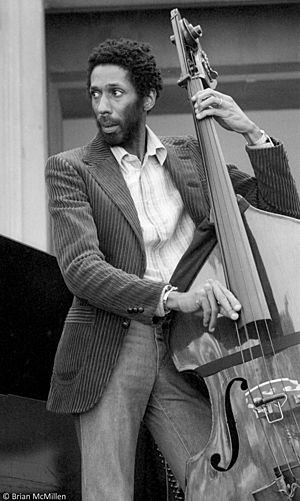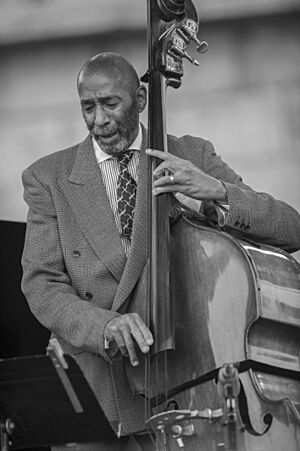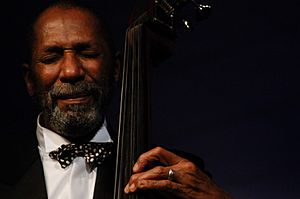Ron Carter facts for kids
Quick facts for kids
Ron Carter
|
|
|---|---|

Carter performing at Berkeley Jazz Festival in May 1980
|
|
| Background information | |
| Birth name | Ronald Levin Carter |
| Born | May 4, 1937 Ferndale, Michigan, U.S. |
| Genres | Jazz |
| Occupations |
|
| Instruments |
|
| Years active | 1959–present |
| Labels |
|
| Associated acts | Miles Davis Quintet, Wayne Shorter, Herbie Hancock, McCoy Tyner, Jim Hall |
Ronald Levin Carter (born May 4, 1937) is a famous American jazz bassist. He has played on more than 2,200 recording sessions. This makes him the most-recorded jazz bassist ever!
Ron Carter has won three Grammy Awards. He also plays the cello. He is known for his long solo career, which has lasted over 60 years. He was also a key member of trumpeter Miles Davis's "Second Great Quintet" from 1963 to 1968.
Some of his own albums include Where? (1961), Uptown Conversation (1969), and The Golden Striker (2003).
Contents
Early Life and Music Beginnings
Ron Carter was born in Ferndale, Michigan. His father worked as a bus driver in Detroit.
When he was 10, Ron started playing the cello. Later, at Cass Technical High School, he switched to playing the bass. He studied music at the Eastman School of Music, earning his bachelor's degree in 1959. He then got his master's degree from the Manhattan School of Music in 1961.
While at Eastman, Ron started playing jazz. He and his friends formed a band that played at a club called the Pythodd Room. There, he met other musicians who told him to move to New York City.
Ron's first jobs as a jazz musician were with Chico Hamilton in 1959. He also played with other famous musicians like Cannonball Adderley and Thelonious Monk. One of his first recordings was on Eric Dolphy's album Out There in 1960.
A Career in Jazz Music
Playing with Miles Davis
Ron Carter was a very important member of the second Miles Davis Quintet in the mid-1960s. This group also included Herbie Hancock, Wayne Shorter, and Tony Williams. Ron joined Miles Davis's band in 1963.
He played on albums like Seven Steps to Heaven and E.S.P.. E.S.P. was the first album to feature only this famous quintet. Ron also wrote three songs for this album. He stayed with Miles Davis until 1968.
Even though he sometimes played electric bass early on, Ron Carter later decided to only play the double bass.
Working as a Sideman
Ron Carter also played on many recordings for other musicians. He was a "sideman," meaning he played alongside the main artist. He recorded with Herbie Hancock, Tony Williams, and Wayne Shorter for Blue Note Records.
He also played with many other jazz greats like Freddie Hubbard and McCoy Tyner. Ron even played on albums for pop stars like Roberta Flack and Gil Scott Heron. He created the famous bass-line for the song "The Revolution Will Not Be Televised."
After leaving Miles Davis, Ron Carter made many albums under his own name. He also appeared on many records with musicians like Joe Henderson and Hank Jones. In 1986, he played on Billy Joel's album The Bridge. In 1987, Ron won a Grammy Award for his music in the film Round Midnight.
Later Years and Awards
In 1994, Ron Carter won his second Grammy Award. This was for a tribute album to Miles Davis. He also played on the hip hop album The Low End Theory by A Tribe Called Quest.
Ron Carter became a respected professor at the City College of New York. He taught there for 20 years. In 2005, he received an honorary doctorate from the Berklee College of Music. In 2008, he started teaching bass at the Juilliard School in New York City.
He appeared in the 1996 film Kansas City. In the movie, he played a duet with fellow bassist Christian McBride. Ron Carter also helps the Jazz Foundation of America. This group helps elderly jazz and blues musicians.
In 2010, France gave Ron Carter a special award called the Commander of the Ordre des Arts et des Lettres. In 2012, he was added to the DownBeat Jazz Hall of Fame.
In November 2021, the Japanese government honored Ron Carter with The Order of the Rising Sun. They thanked him for helping to make jazz popular in Japan. In May 2022, he celebrated his birthday by performing a Tiny Desk Concert.
Ron Carter continues to record music. In August 2024, he was inducted into the Alabama Jazz Hall of Fame.

Documentary Film
Ron Carter: Finding the Right Notes is a documentary film about his amazing career. It was released in November 2022 on PBS.
Personal Life
Ron Carter was married to Janet Hasbrouck Carter, who supported African and African-American art. She passed away in 2000. He has two sons, Ron Carter Jr. and Myles Carter. Myles was a painter and graffiti artist.
Ron Carter also enjoys science fiction!
Discography
- Where? (1961)
- Uptown Conversation (1969)
- Alone Together (1972) with Jim Hall
- Blues Farm (1973)
- All Blues (1973)
- Spanish Blue (1974)
- Anything Goes (1975)
- Yellow & Green (1976)
- Pastels (1976)
- Piccolo (1977)
- Third Plane (1977)
- Peg Leg (1978)
- A Song for You (1978)
- Etudes (1982)
- The Golden Striker (2002)
- Dear Miles (2006)
Filmography
- 2003: Ron Carter & Art Farmer: Live at Sweet Basil
- 2002: Herbie Hancock Trio: Hurricane!
- 2019: Miles Davis: Birth of the Cool
- 2022: Ron Carter: Finding the Right Notes
See also
 In Spanish: Ron Carter para niños
In Spanish: Ron Carter para niños
 | William L. Dawson |
 | W. E. B. Du Bois |
 | Harry Belafonte |


